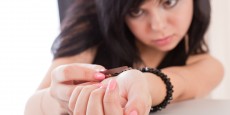

The following is excerpted from an online article posted by the Daily Citizen.
In his latest book, The Anxious Generation, renowned social psychologist Jonathan Haidt argues smartphones and social media damage young people’s mental development — and contribute to Gen Z’s unprecedented levels of mental illness.
American teenagers conservatively spend between six and eight hours on “screen-based leisure activities,” Haidt writes, with most spending at least five of those hours on social media services like Instagram, TikTok, and YouTube.
In The Anxious Generation, Haidt identifies four ways excessive screen time compromises young people’s success in the “real world.”
- Social Deprivation: Haidt says healthy children need face-to-face, unsupervised group play to develop social skills resilience. But kids and teens have increasingly forgone these crucial interactions since social media and smartphones went mainstream around 2013.
Haidt cites data from the American Time Use Study showing people ages 15 to 24 hung out with friends an average of 45 minutes per day in 2020 — more than an hour and 20 minutes less than they did in 2013. - Sleep Deprivation: Haidt confirms a large body of research showing teens who use smartphones and social media get less sleep than their peers who abstain.
“The screen-related decline of sleep is likely a contributor to the tidal wave of adolescent mental illness that swept across many countries in the early 2010s,” Haidt concludes. - Attention Fragmentation: Teens get an average of 192 notifications from social media and communication apps every day — each one a temptation to stop the task at hand in favor of something more exciting.
Haidt says these constant interruptions compromise young people’s ability to pay attention and, by extension, develop the part of their brain responsible for self-control, decision-making, and critical thinking. - Addiction: Haidt suggests that manufacturers and companies like Meta intentionally make smartphones and social media apps addictive, arguing, “The creators of these apps use every trick in the psychologists’ took kit to hook users as deeply as slot machines hook gamblers.”
Haidt asks, “Can you think of any consumer product we would ever let our kids use if there was a one-in-ten chance that our kids would get hooked and have problematic behavior that would interfere with other parts of their life, and, if they do it for two or three hours a day over many years, could change their brain development?”
For all Haidt’s unflinching acknowledgment of technology’s harms, he’s optimistic that conscientious parents can turn back the clock.
Source: Daily Citizen
https://dailycitizen.focusonthefamily.com/sociologist-finds-smarphones-social-media-harm-kids-four-ways/
Source: Home Word






